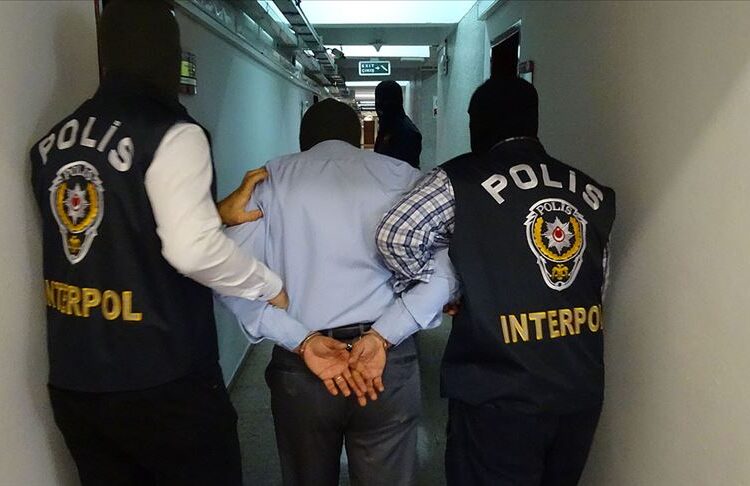Abdullah Bozkurt/Stockholm
Notorious Dutch drug trafficker Joseph Johannes Leijdekkers easily established himself in Turkey, acquiring multiple identities, securing residency and orchestrating his criminal operations from a luxury villa while seamlessly moving funds through the Turkish banking system and consistently evading legal repercussions despite repeated alerts from the Netherlands.
The crackdown on Dutch drug lord Leijdekkers in Turkey ultimately amounted to little more than a public relations show. Despite the initial fanfare surrounding the operations, the efforts appear superficial, serving more to bolster the government’s image than to genuinely tackle organized crime.
Not only Leijdekkers but also his criminal associates managed to escape unscathed in a criminal case belatedly initiated by the Turkish government, despite overwhelming evidence of their involvement in drug trafficking, money laundering and other illicit activities.
Turkey exploited the case to bolster its faltering image, leverage negotiations with several European countries and present a favorable narrative at Financial Action Task Force (FATF) meetings, only to ultimately drop the ball in the case and release everyone detained during the 2023 police operations.
According to information obtained by Nordic Monitor, Leijdekkers, also known as Bolle Jos (Chubby Jos), secured two residence permits in Turkey — one under his real name and the other under a fake identity — along with national identity numbers, allowing him to continue operating his drug trafficking and money laundering enterprise from within the country.
First, he was issued identity number 99276565368 under his real name, with a declared birth date of July 1, 1991 and parents listed as Elizabeth and Joseph. The second residence permit, along with national identity number 99428404392, was granted under the fake name Daniel Ernst Schwank, using a German passport. In this declaration, he listed his birth date as February 19, 1993 and his parents as Charlen and John.
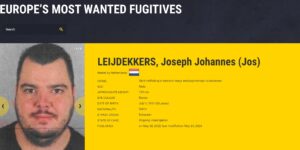
This fact, corroborated in an indictment belatedly filed under mounting pressure from the Dutch government, strongly suggests that Leijdekkers has powerful protection within the Turkish government. Securing two residence permits under two distinct identities would have been virtually impossible without such backing as the application process requires fingerprinting and biometric controls that should have raised red flags.
Given that a background check by intelligence agencies is typically conducted before issuing a residence permit, Leijdekkers would have undoubtedly triggered warnings across the law enforcement and intelligence networks. His ability to bypass these red flags indicates that he must have received assistance from powerful figures within the system.
This is not an isolated incident. Nordic Monitor previously revealed that Ismatullah Khalozai, a key operative of the Islamic State in Iraq and Syria – Khorasan Province (ISIS-K or ISIL-K), has also been operating out of Turkey under multiple identities. Despite being designated as an international facilitator for ISIS-K by the US Treasury on November 22, 2021, Khalozai mysteriously managed to obtain four separate identities and national ID numbers in Turkey.
Leijdekkers, with his ample resources to distribute drug-earned cash, is certainly not an exception in Turkey, a country that has become a hub for drug trafficking and a haven for globally sought-after criminal figures. This permissive environment has been deliberately fostered by the government of President Recep Tayyip Erdogan.
Turkey became his refuge after he sensed that authorities in several European countries were closing in on him. Intercepted messages from encrypted communications service SKY-ECC revealed his involvement in large-scale laundering operations of drug trafficking proceeds, specifically from cocaine.
According to a criminal police file compiled after Leijdekkers had spent three years in Turkey, he first arrived in the country on July 4, 2020 using a German passport under the fake name Daniel Ernst Schwank. On September 7, 2020 he entered Turkey again on a private jet, this time using his real name. He began managing his drug trafficking enterprise from a villa he rented at the five-star Vogue Bodrum Supreme Hotel, owned by a Turkish national named Turan Avcı. He subsequently acquired or rented several additional luxury residences and offices in Istanbul.

According to a report from Turkey’s Financial Crimes Investigation Board (MASAK), Leijdekkers deposited half a million euros in cash into an account at Denizbank on September 22, 2020, two weeks after his second entry to Turkey.
Under normal circumstances, such a substantial deposit by a foreigner would have raised alarms and triggered due diligence checks in the banks of many countries. However, Leijdekkers faced no obstacles due to a series of wealth amnesty laws enacted by the Erdogan government over the past decade. These laws allow both foreign and Turkish depositors to bypass declaring the origin of their funds, with assurances that no administrative or criminal investigations will be conducted into the sources of the money.
On December 3, 2020, just three months after his arrival in Turkey, Leijdekkers secured residency — a remarkably swift process given the usual backlog at Turkey’s migration agency. He also applied for Turkish citizenship by purchasing a luxury villa for half a million euros, with assistance from Fesih Avcı, the brother of Turan Avcı, who had been managing banking transactions on behalf of Leijdekkers.
A Turkish government document indicates that a villa purchased by Leijdekkers at the Vogue Bodrum Supreme Hotel resort in Turkey was used to support his application for Turkish citizenship on November 17, 2020:
The luxury villa Leijdekkers used to apply for Turkish citizenship is well-known as a favored retreat for influential figures from President Erdogan’s ruling Justice and Development Party (AKP) and individuals associated with the presidential palace. Feeling increasingly at ease, Leijdekkers went on to rent four additional villas in the same resort to accommodate his family members, friends and associates for extended periods.
Leijdekkers’s key associate in Turkey is Abdullah Alp Üstün, who has been under surveillance by Turkish law enforcement agencies for multiple crimes, including drug trafficking. While collaborating with Leijdekkers in drug distribution and money laundering, Üstün’s ongoing criminal case from previous drug trafficking charges remains unresolved. He has also encountered legal issues in several European countries in the past.
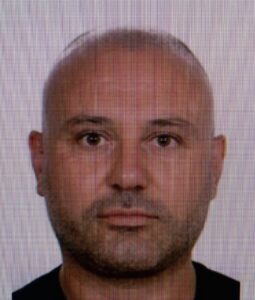
The fact that Üstün was able to continue his criminal activities in Turkey while facing serious criminal charges strongly suggests that he received assistance from insiders within the Turkish government.
Turkish authorities were not only aware of Üstün but also of anyone who came into contact with him, including Leijdekkers. This indicates that, even without alerts from the Dutch authorities, Turkey was aware of Leijdekkers and his associates’ activities but chose not to take action for some time.
The two men have also established familial connections. Üstün is married to Nadia Alla, the sister of Hanane Alla, Leijdekkers’s wife.
Leijdekkers’s first major issue in Turkey arose in March 2021 regarding his migration status, triggered by a request from the Dutch authorities. The Netherlands had secured a blue notice through INTERPOL to obtain further information about Leijdekkers’s activities in Turkey.
Based on that notice, an automatic procedure was triggered by the migration agency, resulting in the revocation of his residence permit and a demand for him to leave the country voluntarily within 10 days in April 2023. However, intervention by influential figures within the Turkish government allowed him to secure an administrative court decision that halted the deportation proceedings. A subsequent attempt to deport him also failed due to the court ruling.
This situation provided a convenient cover for the Erdogan government, which used the court ruling as a pretext to avoid taking action against Leijdekkers. Despite the fact that the courts in Turkey have been under the complete control of President Erdogan and his far-right ally, the Nationalist Movement Party (MHP), the ruling was presented as an obstacle to any further action.
The Turkish government’s previously lax stance on Leijdekkers and his network appears to have shifted only after two significant developments occurred. First, amid rising economic and financial difficulties, Turkey sought to demonstrate its commitment to the FATF, the global watchdog for money laundering and terrorist financing, in an effort to move off the FATF’s grey list. Being on the grey list, which entails increased monitoring by the FATF, was resulting in higher insurance premiums and elevated interest rates and negatively affecting the flow of foreign investment that Turkey desperately needed.
The second development occurred in the fall of 2022, when Dutch authorities demanded action in response to a reported threat against King Willem-Alexander by Leijdekkers. This request was communicated to then-Turkish interior minister Süleyman Soylu during a meeting in Amsterdam with Dilan Yeşilgöz, the minister of justice and security, on October 12, 2022
Fearing that the high-risk threat to the Dutch king could create significant problems for the Erdogan government, Turkish authorities — previously reluctant to take action against Leijdekkers’s network — mobilized their intelligence services and anti-narcotics teams. They secured wiretaps and began closely monitoring the group.
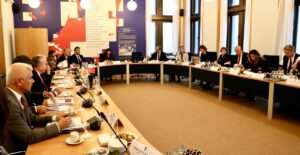
It took many months, but the first operation eventually took place on June 13, 2023, involving a series of raids across four Turkish provinces — Ankara, İzmir, Aydın and Muğla. The operation resulted in the detention of 25 suspects. Turkish authorities also seized assets worth 1.1 billion Turkish lira belonging to Leijdekkers and other members of the organization. The seized assets included 36 properties, 100 kilogram of gold, two motor vehicles, 5.8 million euros, 1.7 million US dollars, 65.7 million Turkish lira and shares in five companies.
The Erdogan government publicized the operation as part of a major public relations campaign to counter allegations that Turkey had become a safe haven for international criminal figures and syndicates. The PR campaign included showcasing luxury cars that were seized and repurposed as Turkish police vehicles, despite the fact that charges were still pending and no convictions had yet been obtained.
Yet, Leijdekkers was notably absent from the raids, and his continued evasion of capture further bolsters allegations of protection by powerful figures within the government or individuals with close ties to it. Police operations continued on June 23, 2023, leading to the detention of three suspects, including Dutch national Jurean Anthony Finik, who was sought under an INTERPOL Red Notice.
In a third operation on June 25, 2023, the police detained three additional suspects, including Leijdekkers’s right-hand man, Isaac Bignan, who was listed on an INTERPOL Red Notice due to arrest warrants issued by Belgium and the Netherlands. On December 27, 2023 another key associate of Leijdekkers in Europe, Eric Schroeder, was apprehended by the police. Schroeder was facing arrest warrants from German authorities and was also listed on an INTERPOL Red Notice.
The police raid on Leijdekkers’s key associate in Europe, Eric Schroeder, was publicized with great fanfare by Turkey’s Interior Ministry:
The police raids eventually resulted in an indictment, but the court rejected it, leading the prosecutor to file a revised version. The suspects faced potential sentences of up to 82 years in prison. TheIr criminal trial began on July 6, 2024. However, no investigation has been conducted into those who facilitated Leijdekkers’s acquisition of two separate identities in Turkey.
Charges against Turan Avcı and his family members, who had assisted Leijdekkers in operating his criminal network, were dropped by the prosecutor. Turan owned the resort where Leijdekkers resided, his nephew Cem Avcı had access to Leijdekkers’s bank account in Turkey and his brother Fesih Avcı received a half-million-euro bank transfer from Leijdekkers. The prosecutor’s decision to drop all charges against them suggests possible government intervention on their behalf.
Although the case was somewhat undermined during the investigation stage by both the police and the prosecutor, it ultimately proceeded to trial at the Istanbul 15th High Criminal Court. The case listed 51 individuals as suspects, with only 15 put in pretrial detention. The detainees included Leijdekkers’s brother Wilhelmus Adrianus Leijdekkers, his key Turkish associate Üstün and Üstün’s son Efe Alp Üstün, German drug trafficker Schroeder, Bignan and Turkish nationals Ali Çelik, Ali Doğan, Aziz Demir, Bahadır Mert Oğur, Murat Pınar, Orhan Lala, Ömer Kurt, Selçuk Aydın, Şakir Kazdal, Talha Ak and Yiğit Eren Gökburun.
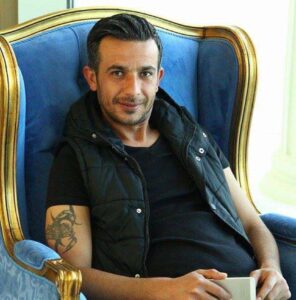
However, the mysterious “big brother” re-emerged during the hearings. In a surprising development, all 15 suspects who were in pretrial detention were released at the first hearing on July 6, 2024 despite the clear flight risk they posed due to their history of possessing fraudulent passports and multiple identities.
The flight risk notwithstanding, the judges decided that all 15 suspects must be freed. While all were subjected to a flight ban, one was put under house arrest with ankle monitoring. Although several suspects were also facing extradition battles in Turkish courts due to requests from the judicial authorities of the Netherlands, Belgium and Germany, the judges overlooked the significant risk of them fleeing once released. This concern was validated when released suspects did indeed evade capture.
What is even more bizarre is that the prosecutor’s office took its time to file a challenge against the release verdict, submitting the motion to reverse the ruling four days later, to the Istanbul 16th High Criminal Court. Typically, prosecutors in Turkey act swiftly in such cases, especially when the media has labeled it as the country’s largest drug lord’s case. On July 10 the Istanbul 16th High Criminal Court, which reviewed the challenge, ordered the rearrest of seven suspects, partially agreeing with the prosecutor’s office. However, by that time, all the suspects had already vanished and were nowhere to be found.

As part of damage control and a public relations campaign, Turkey’s judicial council (Hâkimler ve Savcılar Kurulu, HSK), which is entirely under the control of the Erdogan government, suspended the panel of judges involved in the case: presiding judge Oktay Açar and members Arzu A. and Veysi G. The HSK’s investigation file included an anonymous tip received a day before the release verdict, alleging that the presiding judge had received $720,000 for the decision to release.
Given the magnitude of the drug money involved and the pervasive corruption within Turkey’s judiciary, the reported amount of $720,000 seems relatively modest. It is more plausible that the sum involved was in the millions, potentially implicating higher-level figures in both the judiciary and government. The delay by the prosecutor in appealing the verdict suggests that the four-day grace period may have been intentionally allowed for the suspects to escape.
The police operation against Leijdekkers’s network in Turkey was a key highlight for Turkey during the meeting with FATF officials in Tirana on September 1, 2023. This operation was prominently featured as part of Turkey’s efforts to improve its standing with the global money laundering and terrorist financing watchdog.
The meeting was convened to evaluate whether Turkey had met the FATF’s criteria to be removed from the grey list, a status it had held since October 2021 due to concerns about money laundering and terrorist financing. Turkish Interior Minister Ali Yerlikaya’s sales pitch, which highlighted the police operation against Leijdekkers’s network, proved effective. As a result, Turkey’s efforts were rewarded, and on June 28, 2024, the FATF removed Turkey from its increased monitoring list, commonly referred to as the “grey list.”
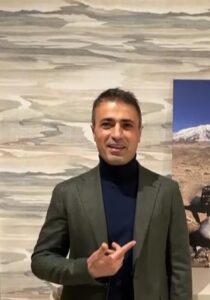
Now that Turkey has successfully exited the FATF’s grey list, the Erdogan government seems less motivated to pursue the suspects in this case. How Leijdekkers managed to escape Turkey, if he indeed did, remains unclear. There have been reports suggesting that he obtained citizenship in the Republic of Abkhazia — a region recognized only by Russia and a few other countries — and is currently residing in Russia.
The entire saga, familiar to those who closely observe the intricate operations of Turkey’s executive, judicial and intelligence branches, is yet another example of the double-dealing often practiced by the Erdogan government.
This approach, while serving the short-term interests of Erdogan and his inner circle, ultimately compromises Turkey’s security as well as that of its partners, neighbors and allies. As long as President Erdogan and his associates continue to enrich themselves through connections with organized crime syndicates and radical organizations, they have little genuine interest in cracking down on such groups.
When it comes to clamping down on opposition, civil society, journalists and dissent in general, Erdogan and his allies spare no effort, displaying a total disregard for the rule of law and fundamental human rights. They are relentless in using every available tool to decimate any form of resistance, showcasing a stark contrast between their harsh approach to silencing critics and their leniency towards criminal elements that benefit their regime.

